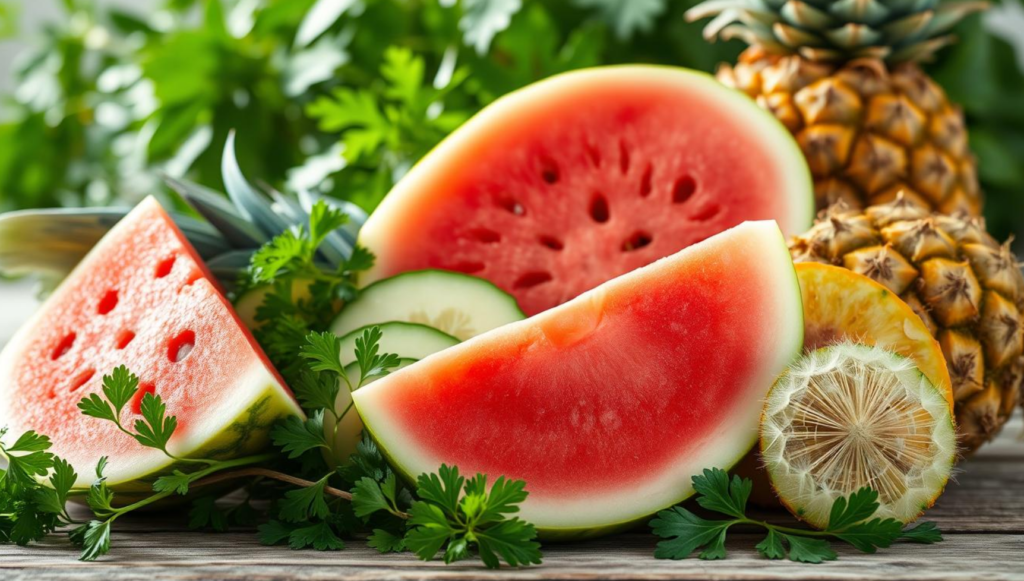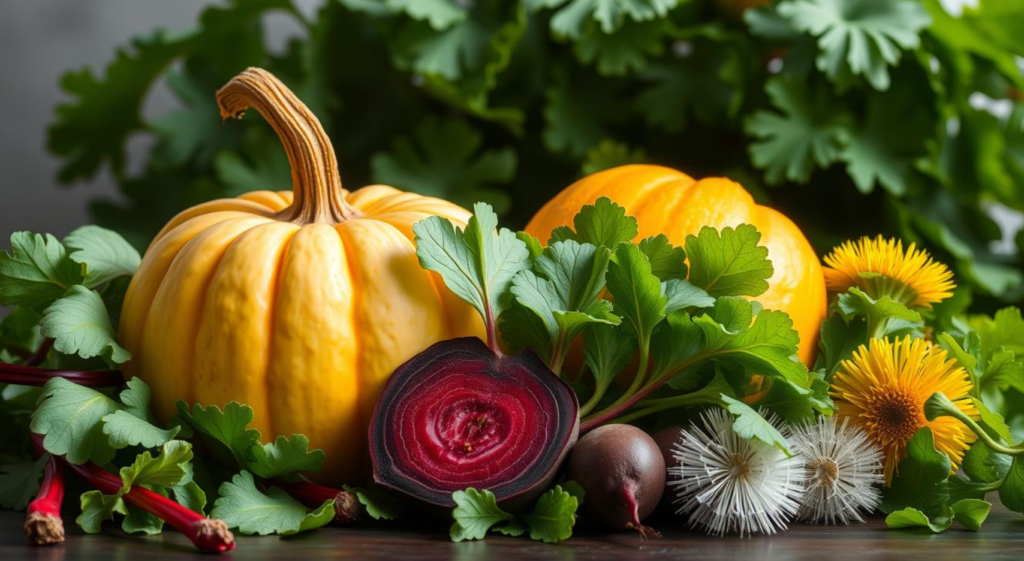What natural diuretics are?
A natural diuretic is a fantastic food that helps our bodies get rid of the liquids and toxins that can make us feel bloated and weigh more than we’d like.
The great news is that you can easily include them in your diet if you want to purify your kidney and liver.
What are the benefits?
- Easy elimination of retained liquids;
- Ease bloating;
- Eliminating toxins is a great way to improve your health;
- Water loss reduces blood volume and lowers blood pressure, which is good if you have high blood pressure;
- They’re packed with essential nutrients like fiber, antioxidants, and vitamins;
- Help manage edema and kidney stones.

Difference Between Natural and Medical Diuretics
Medical diuretics are drugs for treating health issues, while natural diuretics are found in foods. Natural diuretics are gentler and have fewer side effects. They can be easily added to a healthy diet, helping you make better choices for your health.
DIURETIC FOODS
Vegetables
Pumpkin – Eat boiled, unsalted pumpkin purée.
Watercress – Juice diluted with water. Take 250 ml, 3 times a day.
Beet – Cook it and drink the broth (3 cups a day).
Dandelion – Juice diluted in water. Take 3 cups a day.

Fruits
Pineapple- Eat exclusive meals 3 times a week.
Coconut – Coconut water. Take 250 ml, 2 times a day.
Apple – Natural juice. Take 250 ml, 2 times a day.
Watermelon- Eat meals only once a week.
Pear – Eat exclusive meals 3 times a week.

Plants
Lemongrass – Tea from the leaves (30 g per 1 liter of water). Take 5 cups a day, sweetened with bee honey.
Carqueja – Tea from the leaves (30 g per 1 liter of water). Take 5 cups a day.
Horsetail – Tea from the leaves (30 g to 1 liter of water). Take 5 cups a day, sweetened with bee honey.
Leather hat – Tea from the leaves (30 g per 1 liter of water). Take 5 cups a day, sweetened with bee honey.
Fennel – Tea from the leaves and seeds (30 g per 1 liter of water). Take 5 cups a day, sweetened with vanilla honey.
Stone breaker – Tea from the leaves and roots (50 g per 1 liter of water). Take 5 cups a day.

Other treatments
Geotherapy / Clay therapy – Make a compress on the kidney area, lasting 2 hours. As explained here
Hydrotherapy – Drink 2 liters of pure, fresh water every day. As explained here
The Role of Diuretic Foods in Weight Management
Managing your weight is all about balance. Diuretic foods can be a big help. They help you lose water weight and get a leaner body.
Natural Water Weight Loss
Diuretic foods make you pee more often and in bigger amounts. This gets rid of extra water and salt. You’ll feel lighter and more energetic. Foods like leafy greens, citrus fruits, and berries are great for this.
Timing Your Diuretic Food Intake
Eat them in the morning and early afternoon. This lets your body get rid of excess fluids before you sleep.
Combining Exercise with Diuretic Foods
Exercise and diuretic foods work together well for weight loss helping remove toxins and fluids. Diuretic foods help your body do this better. Together, they help you lose weight in a healthy way.
For lasting weight management, it’s all about balance. Diuretic foods are helpful, but don’t forget a balanced diet, plenty of water, and regular exercise.
Cautions
| Potential Side Effects | Precautions |
|---|---|
| Dehydration | Stay hydrated by drinking plenty of water as explained here |
| Electrolyte imbalances | Replenish electrolytes through a balanced diet |
| Increased urination | Monitor fluid intake and bathroom frequency |
| Interactions with medications | Consult a healthcare professional, especially for those with medical conditions |
Contraindications
- Not recommended for children, adolescents, pregnant women, elderly people or those suffering from chronic diseases.
- For pregnant women and those with high blood pressure foods like parsley, celery, and ginger might not be good for them.
- Also, people on prescription diuretics or other medicines should watch out for interactions. Mixing these foods with their meds can upset the balance of fluids and electrolytes, this could lead to bad side effects, always check with a healthcare expert before making big changes to your diet.
Diuretic Foods and Pregnancy
It’s crucial to consult with your healthcare provider before making significant changes to your diet, including the consumption of diuretic foods.
While some diuretic foods are generally safe, but Parsley, celery, and ginger might not be good for some pregnant women.
Key Takeaways
- Diuretic foods help eliminate excess water and toxins from the body, promoting healthy fluid balance.
- Natural diuretics can be found in a variety of fruits, vegetables, herbs, and spices, each offering unique health benefits.
- Incorporating diuretic-rich foods into your diet can alleviate water retention, reduce bloating, and support overall well-being.
- Diuretic foods can be a safe and effective alternative to medical diuretics, with fewer potential side effects.
- Understanding the role of diuretic foods in weight management and fluid regulation can empower you to make healthier dietary choices.
